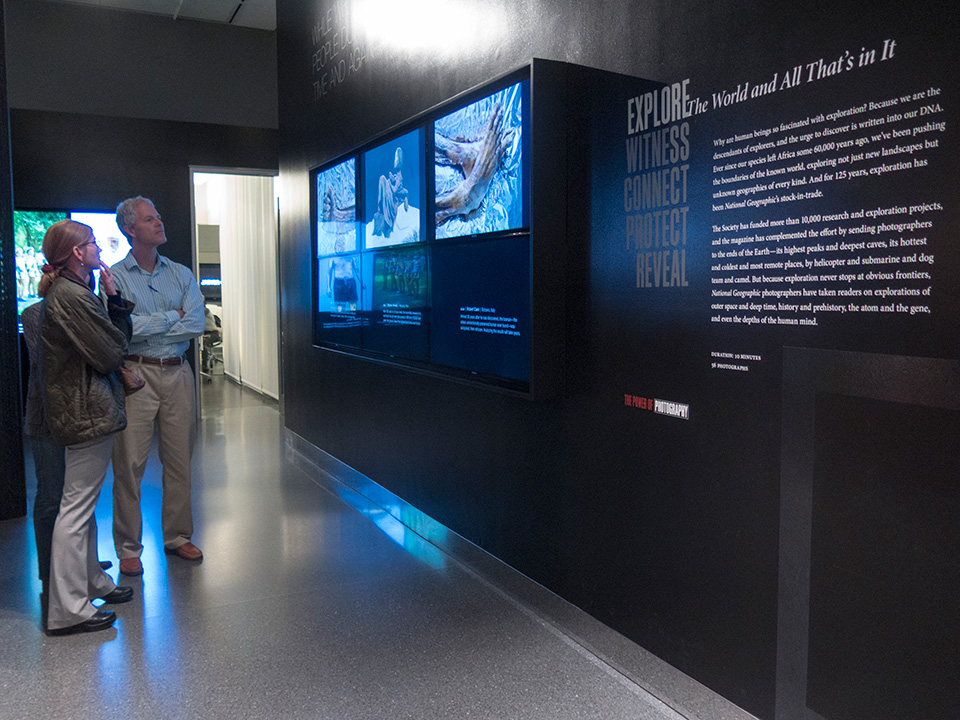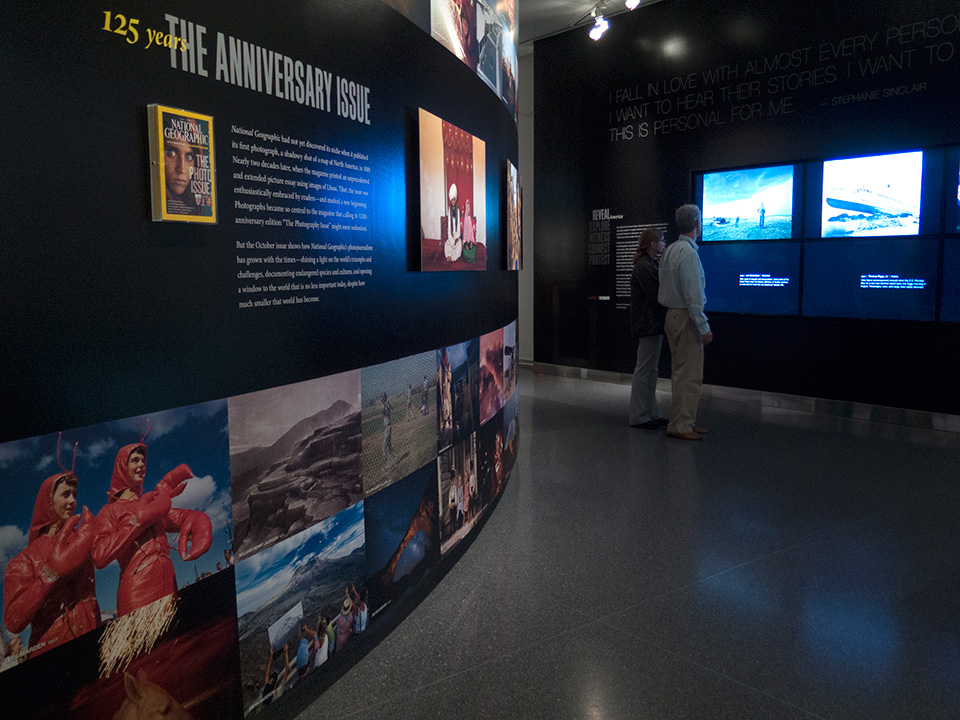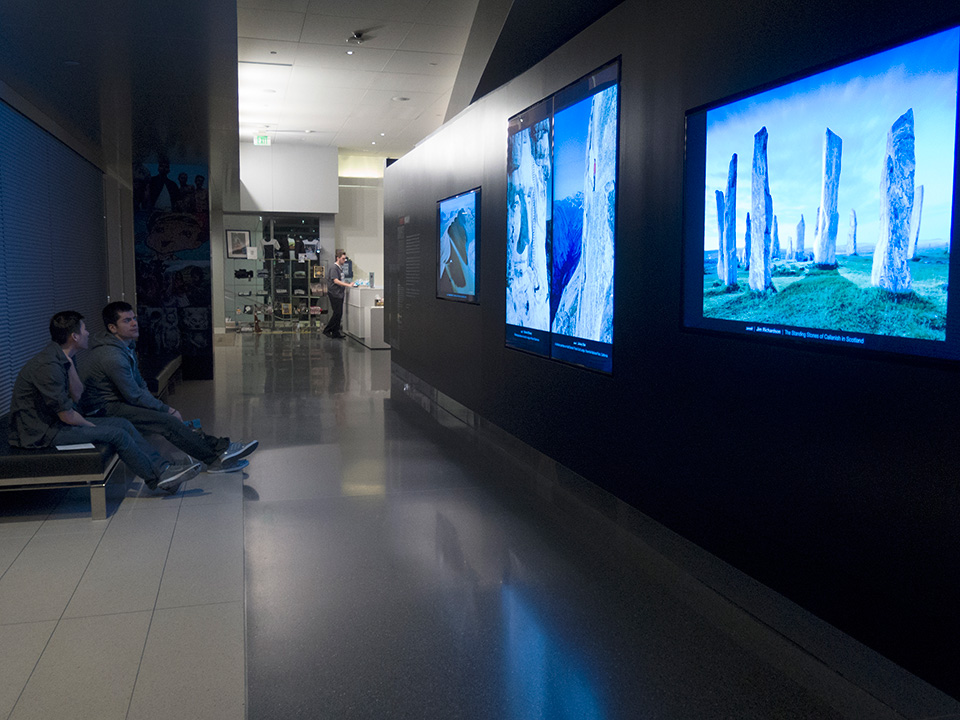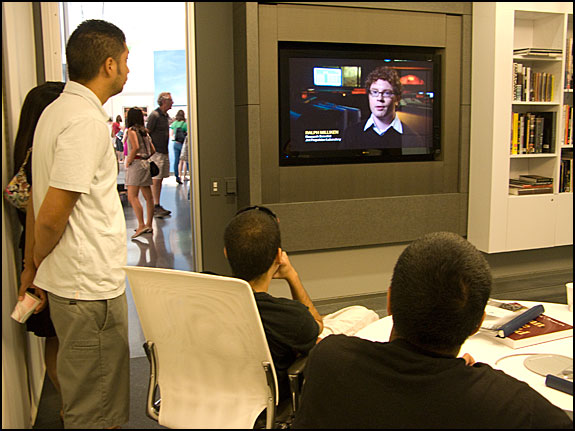The Annenberg Space for Photography
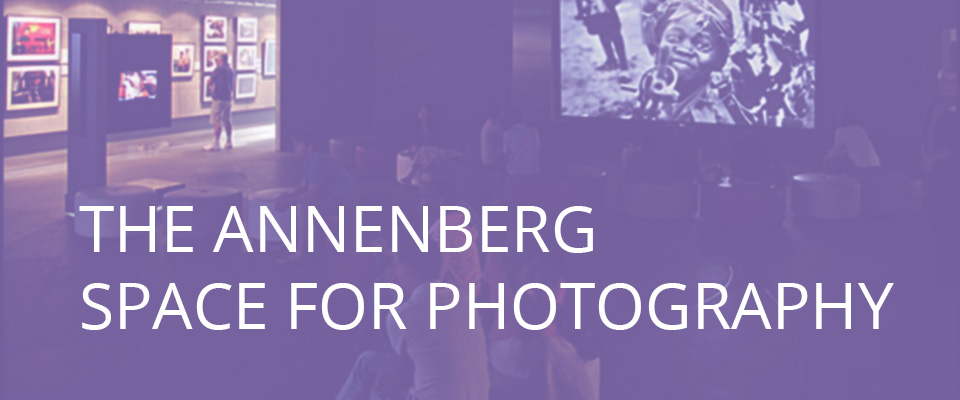
Now closed, the Annenberg Space for Photography, an innovative exhibition space in Los Angeles, put a fresh twist on the way it presented photography. Combining prints and up-to-the-minute digital technology, the Digital Gallery offered a dynamic and interactive viewing experience that created many new photography fans—and reinvigorated longtime photography enthusiasts.
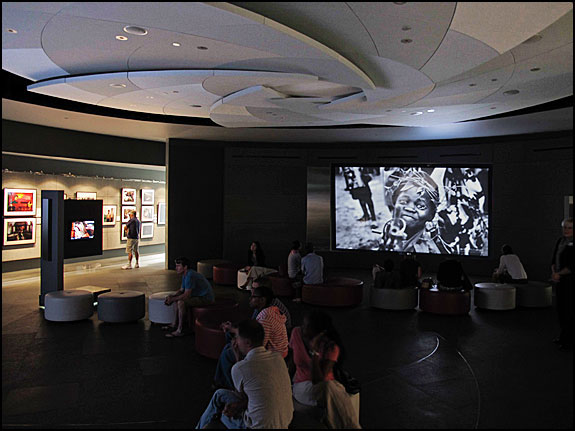
Visitors enjoyed a digital exhibition as part of The Space's community programming, Voice of the Photographer and Behind the Lens. These digital features were part of what made the Annenberg Space for Photography a unique 21st Century gallery experience. Courtesy © Suzie Katz
"Photography shows us the secret within the secret, the moment almost lost, the story never written. Photography is the best running commentary on the human condition that the world has ever known." -Wallis Annenberg
The brainchild of philanthropist Wallis Annenberg, the Space was a spectacular project. After opening in March of 2009, it welcomed more than numerous visitors, exhibited a multitude of photographs, and offered free lectures and workshops.Click here to learn more about the Annenberg
Location
Wallis Annenberg, Vice President and Trustee of The Annenberg Foundation, has helped the Foundation give more than $150 million to more than 500 organizations around the world in the arts and culture, education and youth development, civic and community life, health and human services, and animal services and the environment.
The Foundation has supported the visual arts through grants to the Museum of Modern Art, Tate Gallery, Whitney Museum of Modern Art, Children's Museum of Los Angeles, and many others.
Of course, the Foundation's devotion to photography has culminated in its creation of The Annenberg Space for Photography, a state-of-the-art gallery featuring print and digital work by contemporary photographers.
Click here for more information and plan your visit!
The first prominent venue in Los Angeles dedicated solely to photography, The Space had the ability to showcase an unprecedented number of images—over 80 classic prints and more than 1,000 digital images—all stunningly displayed. The unique gallery used state-of-the-art rear-projection imaging technology customized for The Space.
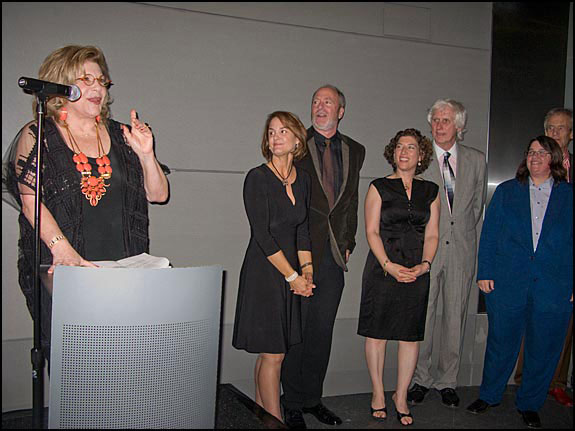
Founder Wallis Annenberg spoke at the inaugural opening while exhibiting photographers, Carolyn Cole, Greg Gorman, Lauren Greenfield, Douglas Kirkland and Catherine Opie, look on. Courtesy © Suzie Katz
The primary goal of The Space was to prompt visitors to view the world in a new light and gain insight into the human condition through the eyes of inspired photographers. The Annenberg Space for Photography's Century City location was both accessible and historically significant to Los Angeles. Standing where the Shubert Theatre once stood, the Space was a sprawling 10,000-square-foot space whose unique architecture was designed to gently entice visitors from one exhibition space to the next.
Annenberg's passion for the art form led her to examine the challenges most traditional museums experience when exhibiting photographic work, and to overcome them. Many museums have remarkable photography collections, but oftentimes their archives are more comprehensive than the available exhibition space allows. This motivated Annenberg and The Annenberg Foundation Trustees to create a new paradigm for experiencing photography.
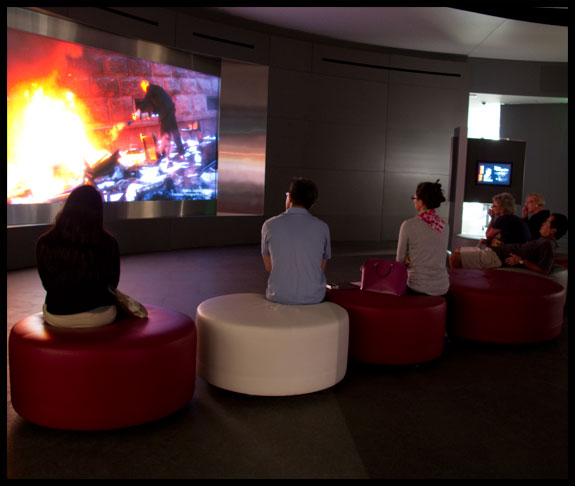
Vibrant images came alive on-screen giving exhibiting photographers the chance to display their work on a large scale while it also provided a unique viewing experience for visitors. Courtesy © Susan Katz
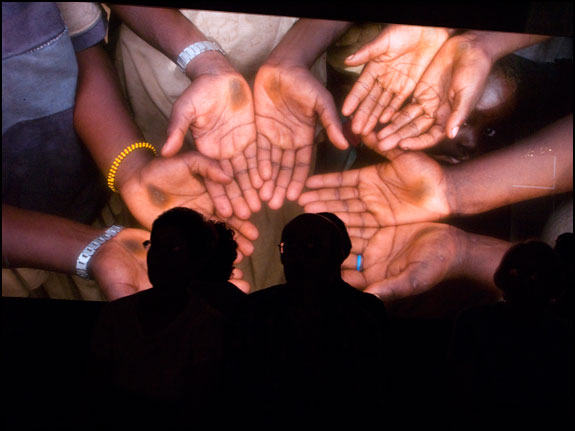
Visitors enjoyed a digital exhibition as part of the Space's Voice of the Photographer. This slideshow was part of what made the Annenberg Space for Photography a unique 21st Century gallery experience. Courtesy © Suzie Katz
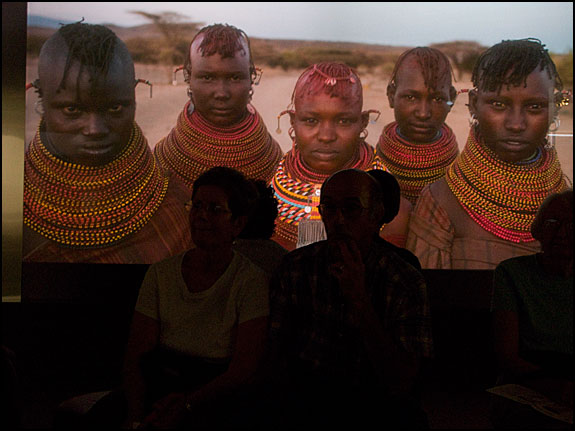
Visitors were provided the opportunity to deeply engage with work by some of the top photographers whose compelling images were shown larger than life and in amazing detail. Courtesy, © Suzie Katz
Amazing Space
Vibrant images came alive on-screen giving exhibiting photographers the chance to display their work on a large scale and provided a unique viewing experience for visitors. Courtesy © Suzie Katz
The Annenberg Foundation recruited internationally renowned AECOM Designs, formerly DMJM Rottet, to design The Annenberg Space for Photography, a thoughtfully contemporary building with interior gallery spaces that mimiced the inner workings of a film camera. The main gallery housed two large rear projection screens, each 7 by 14 feet, that were custom made by Stewart Filmscreen using a special optical coating to blend the light from multiple projectors, which created a one-of-a-kind viewing experience.
This award-winning technology allowed the gallery to display limitless digital images, one after another in ultra-high definition. Images were displayed in a variety of orientations: side-by-side or one above the other, either landscape or portrait, showing them to their best effect.
The gallery ceiling evoked the spiral shape of a film canister, and at its apex another unique design element resembled a camera's aperture. Visitors wound their way around the curved walls of the gallery, stopping to engage in alternative educational opportunities along the way. Exhibitions at The Space revolved frequently.
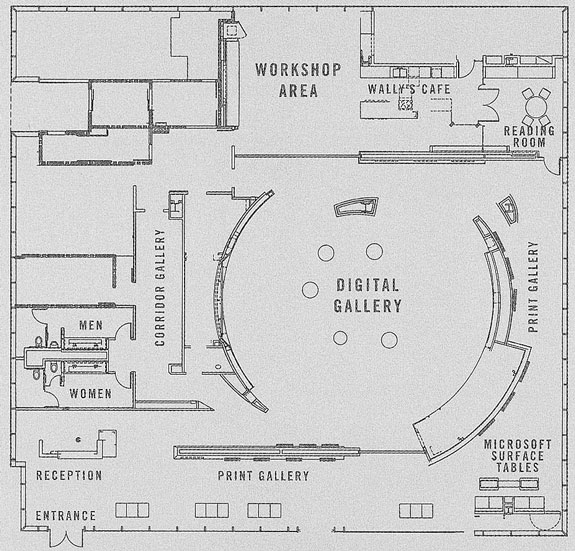
The Space's floor plan illustrated the curvilinear Digital Gallery walls that emulated the aperture of a camera. Courtesy © The Annenberg Space for Photography
Microsoft Surface Tables
While some visitors viewed print photography on the gallery's curved walls by artists including Greg Gorman, Douglas Kirkland, Lauren Greenfield, Carolyn Cole, Catheine Opie, others stop to marvel at the interactive Microsoft Surface tables. The state-of-the-art touch screen technology allowed visitors to control how they viewed an image.
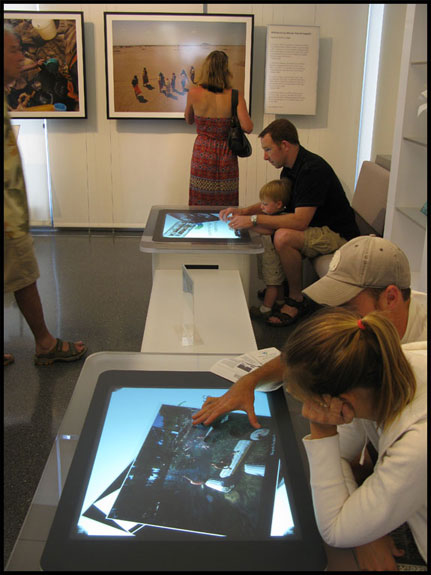
A young family had fun exploring the capabilities of the Microsoft surface table, where visitors could move, rotate, sort through, and enlarge digital images with the touch of their fingertips. Courtesy © Suzie Katz
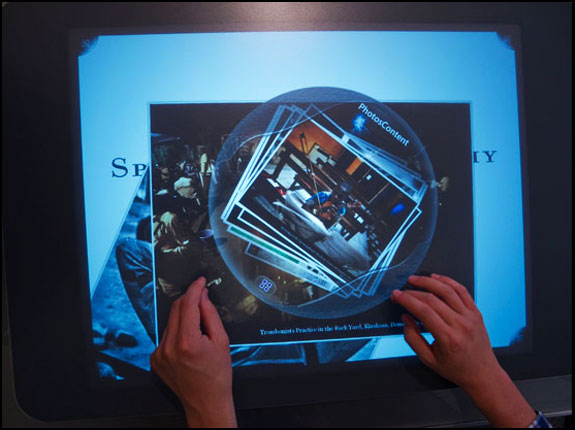
A close-up view from the visitor’s perspective shows how guests interacted with the Microsoft surface table. The unique interactive table was a wonderful way to get up close and personal with some of the gallery’s digital photographs and was an example of how The Space set itself apart as a leading state-of–the-art gallery. Courtesy © Suzie Katz
For example, users could select an image, rotate it, zoom in, zoom out, or organize several images into a slideshow—all with the touch of their fingers to the screen. The wonderful hands-on experience was perfect for children and adults.
The Reading Room
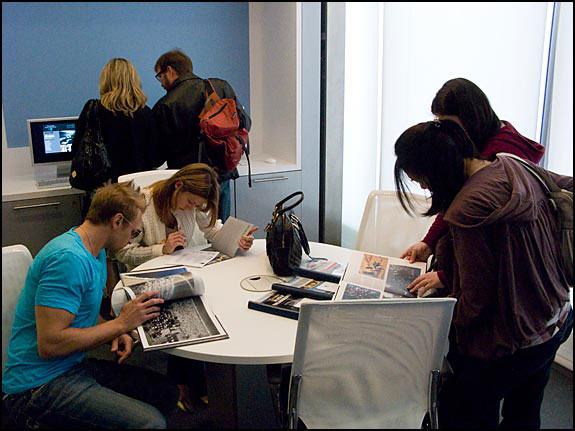
Curious visitors in the Reading Room paged through photography books as they searched through The Space’s extensive image collection. Courtesy © Suzie Katz
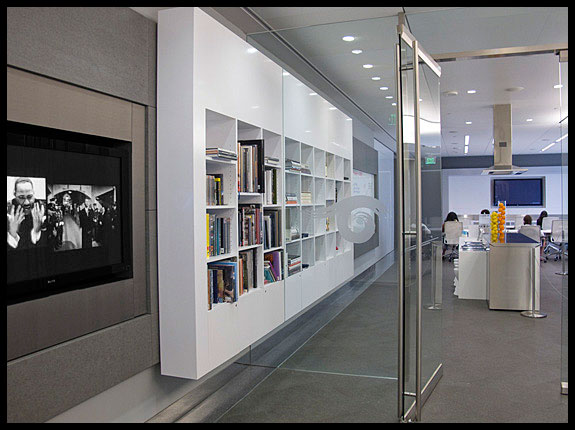
While exploring the Annenberg Space for Photography, visitors could find various stop-off destinations to further their photographic curiosity. A couple of these destinations were the Reading Room and Wally’s Cafe. Courtesy © Suzie Katz
Wally's Cafe
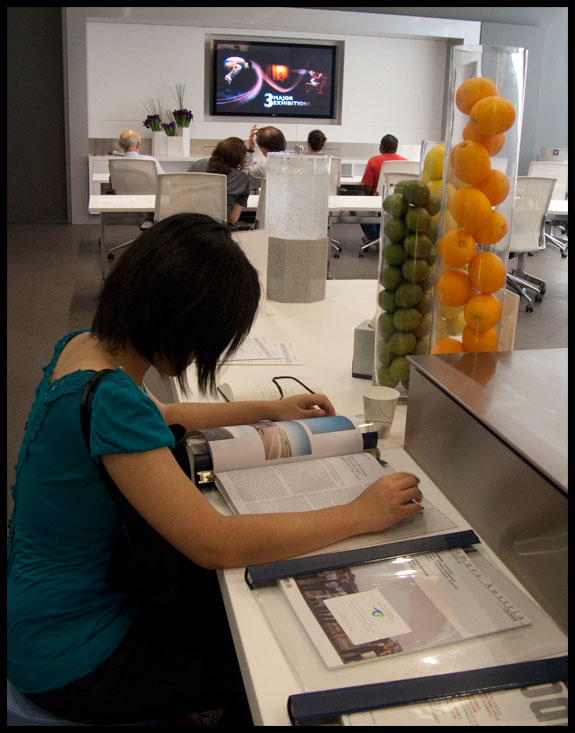
Visitors could sit comfortably in both Wally's Cafe and the Workshop. Here some visitors watched video lectures by architectural photographer, Julius Shulman, while another read a photography book. Courtesy © Suzie Katz
The Reading Room was filled with books to educate and inspire visitors about photography. Guests were encouraged to explore this art form through the many different titles available, and in many cases, read about the very photographers featured in current exhibitions. Visitors could also peruse The Space's extensive collection of international photo magazines, videos, and databases.
Iris Nights
Touches like the inclusion of Wally's Cafe encouraged guests to use the Annenberg Space for Photography as a place for inspiration and education.
IRIS Nights brought to life the featured exhibition with free hour-long lectures by exhibiting photographers. These events were held at The Space under the iris ceiling in the main digital gallery. This thoughtful addition to the museum interactive experience encouraged visitors to expand their knowledge of, and passion for, photography.
Grand Opening in 2009
L8S ANG3LES: Perspectives of Eleven LA Photographers
At this inaugural exhibition guests celebrated the best works from eight internationally recognized photographers. The collection was thoughtfully curated and addressed themes including architecture, portraiture, art, and photojournalism, combined with the fast-paced energy inherent to the Los Angeles area. The numbers in the exhibition's title hint at its theme of cultural diversity and modern life.
This impressive showcase also featured some of the best work of Los Angeles Times photographers, spanning nearly 100 years including Julius Shulman, Tim Street-Porter, Douglas Kirkland, Greg Gorman, Lauren Greenfield, Catherine Opie, Lawrence Ho, Kirk McKoy, and Genaro Molina.
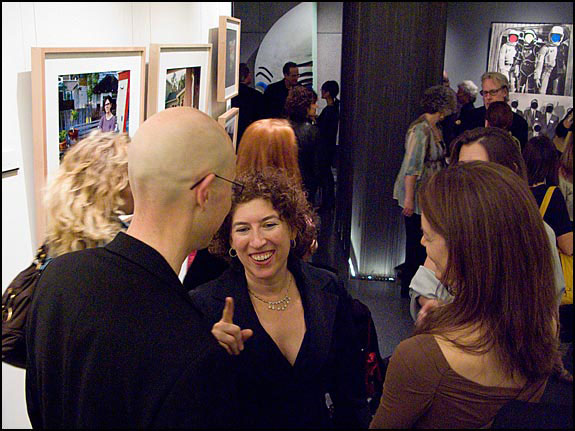
Photographer Lauren Greenfield at the inaugural exhibition and Grand Opening in 2009. Courtesy © Suzie Katz
The exhibition helped propel the message behind Annenberg's mission to create a modern space to view images that provoke thinking and wonder while helping to build a stronger community.
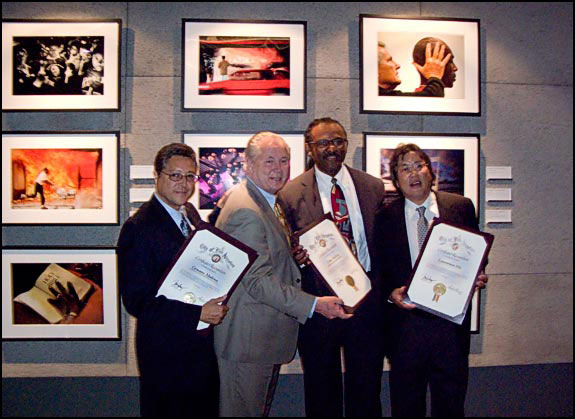
The three LA Times photographers, Genaro Molina, Kirk McCoy and Laurence Ho, display awards for their work in photojournalism. Courtesy © Suzie Katz
Wallis Annenberg: A Passion for Photography
Wallis Annenberg grew up surrounded by her father's spectacular collection of 19th Century art.
"It was all in beautiful pastel colors," she remembers, "I used to say, 'But Dad, that's not the way the world looks.' That's probably the reason that the photographic arts have always been so close to my heart and why I was so eager to help create this space."
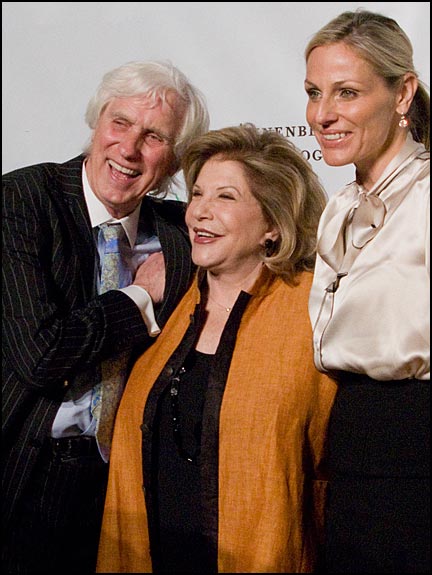
Douglas Kirkland, Wallis Annenberg and Jamie Tisch posed for pictures on the red carpet at the opening of the Annenberg Space for Photography. Courtesy © Suzie Katz
Annenberg worked with her fellow Trustees at The Annenberg Foundation to conceive the gallery, which curated its own exhibitions, with guest curators, and hosted traveling exhibitions. The Photography Space also showed often unseen photographic collections held by museums, galleries, and art organizations. What's more, admission was free, giving everyone an opportunity to see the work of the world's most innovative and evocative photographers, covering the full range of the human condition—from celebrity to war and beyond.
"Photography is one of the most accessible and personal forms of art. We are thrilled about creating a space completely dedicated to it. The more available and accessible these great works are, the better off our culture and community will be." -Wallis Annenberg

